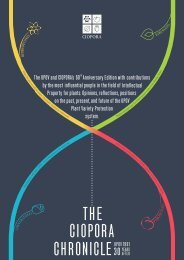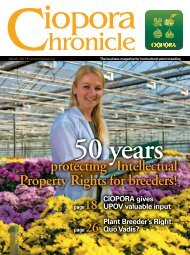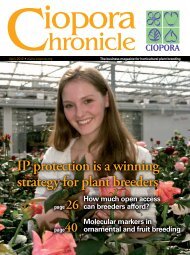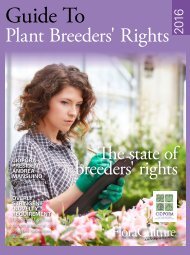2014 CIOPORA Chronicle
CIOPORA annual magazine on Intellectual Property protection for plant innovations 2014. Produced in cooperation with FloraCulture International. Read in the 2014 issue: - Innovation bridges gap between tradition and future - Challenges of modern horticulture - IP Solutions for the Future: Creative Barcode - ‘Mission FUTURE’: CIOPORA’s position papers on IP - Enforcement reform: an Australian story - Trademarks and variety denominations - harmonization underway? and more...
CIOPORA annual magazine on Intellectual Property protection for plant innovations 2014. Produced in cooperation with FloraCulture International.
Read in the 2014 issue:
- Innovation bridges gap between tradition and future
- Challenges of modern horticulture
- IP Solutions for the Future: Creative Barcode
- ‘Mission FUTURE’: CIOPORA’s position papers on IP
- Enforcement reform: an Australian story
- Trademarks and variety denominations - harmonization underway?
and more...
Create successful ePaper yourself
Turn your PDF publications into a flip-book with our unique Google optimized e-Paper software.
Australian story<br />
was not a general review of the PBR<br />
legislation, but more precisely it was<br />
a review established to identify difficulties<br />
in enforcement and recommend<br />
solutions to these difficulties<br />
where appropriate.<br />
Although I am not completely<br />
satisfied with all the outcomes of<br />
this review, and there are many<br />
areas that require further reform,<br />
I do, however, feel that ACIP has<br />
Accepted in principle<br />
The following is an outline of the<br />
recommendations accepted in<br />
principle:<br />
• There will be no change to the<br />
operation of farmer’s privilege.<br />
The Government indicated that it<br />
can work with the plant breeding<br />
industry and achieve the recommended<br />
result by better explaining<br />
the operation of section<br />
17 in education and awareness<br />
campaigns.<br />
• An on-going Expert Panel to be<br />
established to provide guidance<br />
and opinions on general issues or<br />
specific cases concerning the<br />
PBR Act and related law. The<br />
Government noted that PBRAC<br />
already has the powers to investigate<br />
technical matters and administrative<br />
matters arising under the<br />
recommended to Government a<br />
well-defined road map that will<br />
assist breeders in the future by<br />
not only protecting their varieties,<br />
but more importantly - making it<br />
more efficient and cost effective to<br />
enforce their IP rights in Australia.<br />
The full ACIP report, as well as the<br />
Government response, is available<br />
online at http://www.acip.gov.au/<br />
reviews/all-reviews/reviewenforcement-pbr/<br />
|||<br />
PBR Act, once these matters have<br />
been referred to the PBRAC by<br />
the Registrar.<br />
• IP Australia to liaise with the<br />
Australian Federal Police (AFP)<br />
and Commonwealth Director<br />
of Public Prosecutions (CDPP)<br />
with a view to increase the<br />
number of investigations and<br />
prosecutions of the PBR infringement<br />
cases.<br />
• Introduce an Information Notice<br />
System into the PBR Act based<br />
on the UK Information Notice<br />
system. IP Australia is to investigate<br />
the feasibility of developing a<br />
cost-effective Information Notice<br />
System to enable PBR owners to<br />
obtain information on the source<br />
of plant material from suspected<br />
infringers.<br />
IP’s central office in Canberra (Photo credits: IP Australia).<br />
Not accepted<br />
• A new “purchase” right to be added to s. 11 (general nature<br />
of PBR). Had this recommendation been accepted it would<br />
have provided the ability for an ‘End Point Royalty’ to be<br />
charged at place of purchase similarly to the pay-by-scan that<br />
is used in the USA.<br />
• Amendment to s. 4 (c) (definition of Essentially Derived<br />
Varieties) by replacing the test for important features with a<br />
test for essential characteristics. This recommendation would<br />
have brought Australia and <strong>CIOPORA</strong>’s positions on EDV<br />
and Minimum Distance closer together.<br />
• Introduction into the PBR Act of the PBR seizure powers<br />
for customs. The rejection of this recommendation places<br />
Australia at odds with other developed nations and makes<br />
global Plant Variety Protection problematic. It is greatly<br />
advisable for a market economy such as Australia, to have the<br />
ability to stop counterfeit material from entering the country<br />
with the use of customs. The rejection doesn’t mean a court<br />
order can’t be obtained to stop infringing product, but adds<br />
an additional step and is counter to the desired reform of<br />
enforcement.<br />
• Protection against mendacious variety declarations.<br />
Photo credits: IP Australia<br />
About the author<br />
Chris Prescott has 30 years of experience in the cut rose industry,<br />
24 of which as the managing director of his own enterprise, Prescott<br />
Roses Pty Ltd. In the course of his carrier he taught commercial rose<br />
growing at Swinburne University and since 1994 he has been working as<br />
Qualified Person (QP) in the Australian PBR Scheme. Chris’ involvement<br />
with Grandiflora, where he is dealing with variety selection and IP<br />
strategies, began in 2004. He is currently in his second term as a member<br />
representing plant breeders at PBRAC (Plant Breeders Rights Advisory<br />
Committee), a committee that advises the Federal Minister for Industry<br />
on issues related to the PBR scheme at IP Australia.<br />
<strong>CIOPORA</strong> <strong>Chronicle</strong> June <strong>2014</strong> | www.FloraCulture.eu 41









